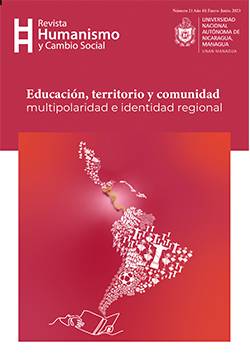COVID-19 and adultcentrism in public policy in the Yucatán Peninsula, Mexico
DOI:
https://doi.org/10.5377/hcs.v21i21.16764Keywords:
Adult centrism, vulnerability, childhood, public policies, COVID-19Abstract
The COVID-19 pandemic left evidence that governments were not fully prepared to face a health situation like the one experienced between 2020 and 2022. The effects and damage that occurred during the contingency and confinement at fi rst glance seemed to have affected the entire population equally, however, this paper analyzes through two issues: orphanhood by COVID-19 and the National Day of Sana Distancia, which, in a specifi c region of Mexico, there were conditions of adult centrism in the management of public policy related to the pandemic. In this sense, contagion figures in childhood and adult groups were reviewed, as well as the different programs that were implemented to establish that childhood was a group to a certain extent ignored by the policies implemented. It is concluded that there is evidence of adult credism in the management of the COVID-19 pandemic by both the Mexican federal government and the state governments of Campeche, Quintana Roo, and Yucatán.
Downloads
200
References
Abud, S. (2018). Infancia, niñez en riesgo, vulnerabilidad infantil, ¿Qué reflejan estos conceptos? OMNIA, 1(1), 51-62. Obtenido de http://revistas.ucasal.edu.ar/index.php/RO/article/view/24
Achoy, J. (2018). Desbalance adultocentrista en política y derecho. Anuario Centro de Investigación y Estudios Políticos(8), 63-75. Obtenido de https://revistas.ucr.ac.cr/index.php/ciep/article/view/34317
Camarano, A. (2020). Camarano, A. A. (2020). Depending on the income of older adults and the coronavirus: orphans or newly poor? Ciência & Saúde Coletiva, 25, 4169-4176.
Coba, J., Nuñez, L., Badillo, A., Villareal, A., & Sosa, M. (2022). Implicaciones socioemocionales y educativas en la niñez y la familia en tiempos de pandemia. Memorias SUCRE Review, 1(1). Obtenido de https://ojs.estudiantesucre.edu.ec/index.php/memorias_sucre_review/article/view/57/57
Cox, D. (2022). What will happen to the orphans of COVID-19? BMJ, 379, 1-2. doi:10.1136/bmj.o2838
Dinh, C., Hue, T., Al-Tawfi q, J., & Memish, Z. (2022). Children orphaned by COVID-19: a grim picture and the need of urgent actions. Travel Medicine and Infectious Disease, 50. doi:10.1016/j.tmaid.2022.102446
Duarte, C. (2012). Sociedades adultocéntricas: sobre sus orígenes y reproducción. Revista Última Década(36), 99-125.
Duarte, C. (2015). El adultocentrismo como paradigma y sistema de domini. Análisis de la reproducción de imaginarios en la investigación social chilena sobre lo juvenil. Barcelona: Universitat Autónoma de Barcelona. https://www.tdx.cat/ handle/10803/377434#page=1
Duarte, K. (2016). Genealogía del adultocentrismo. La constitución de un patriarcado adultocéntrico. En K. Duarte, & C. Álvarez, Juventudes en Chile. Miradas de jóvenes que investigan (págs. 17-48). Santiago: Universidad de Chile.
Fernández, L., Mochales, C., Pérez, I., Casas, J., & Cruells, C. (2023). Revisión bibliográfica sobre la Vulnerabilidad social y los procesos de hospitalización: una mirada desde el trabajo social sanitario. Itinerarios de Trabajo Social(3), 66-75. https://revistes.ub.edu/index.php/itinerariosts/article/view/40796
Gobierno de México. (9 de febrero de 2021). Adultocentrismo: qué es y cómo combatirlo. https://www.gob.mx/sipinna/articulos/adultocentrismo-que es-y-comocombatirlo?idiom=es
Downloads
Published
How to Cite
Issue
Section
License
Copyright (c) 2023 Universidad Nacional Autónoma de Nicaragua, UNAN-Managua

This work is licensed under a Creative Commons Attribution-NonCommercial-ShareAlike 4.0 International License.




